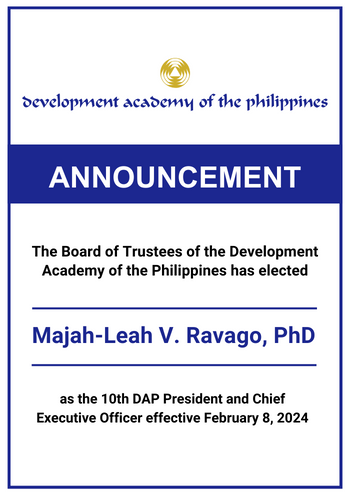Congressman Joey Salceda of the Second District of Albay gave a glimpse of what he envisions to be the government of the future, essentially saying that new technology has to be harnessed if the people are to benefit from current-day realities.
Speaking at the 2nd International Conference on Public Sector Productivity jointly organized by the Asian Productivity Organization and the Development Academy of the Philippines, Salceda enumerated seven changes that should be made for a more effective Philippine government in the future.
These are the promulgation of a lean Constitution focusing on the basic rights and system of government and where amendments are made through legislation, the government allowing the private sector to take care of certain tasks and then focusing instead on its key functions, the designation by all government departments of a digital transformation officer or innovation officer in light of the digitization of daily lives, the reeducation of the bureaucracy and regulatory changes taking into account technological changes, the empowerment of government by the Constitution to quickly experiment with new and different institutions to cope with fast changes, the inclusion of “a right to broadband” as one of citizens’ civil rights, and allowing for a more direct democracy through propositions like voting through mobile phones.
Let Congress do it
Salceda said that since Constitutional changes take a very long time, the government should let Congress adopt, fix, or amend laws in accordance with changes in the situation.
He also said that government should outsource to private companies functions that it has no competence to do, like running the MRT and customs management, while focusing more on its core functions of national defense, keeping peace and order, sound monetary policy and providing basic education.
In addition, Salceda told an international audience of almost 300 at the DAP Conference Center in Tagaytay City that all government offices must now have a digital transformation or innovation officer to reinvent government through the redesign of every aspect of work in the workplace. This is because of the digitization of people’s lives where people basically function based on new technology.
Taking into account such changes as those occurring in technology, the international dimension of government people’s work as well as cyber threats should also be factored in as government reeducates the bureaucracy and makes regulatory changes, Salceda added.
Experimentation
Although not necessarily having to conform to proposals to shift to federalism, the Albay legislator said that a new Constitution should empower the government to quickly experiment with new and different institutions to cope with fast changes occurring around it, and that the “right to Internet access” or “freedom to connect” should be made a basic right based on a 2016 United Nations resolution that is now observed in countries like Costa Rica, Estonia, Finland, France, Greece and Spain.
Finally, Salceda envisioned that with the advent of technology and the Internet, the Philippines should now allow for a more direct democracy with citizens directly voting through their mobile phones as it is more possible for countries now to have direct electronic voting on every issue.
Salceda declared that technology is moving faster now than the ability of governments to adapt and technology titans like technology companiesFacebook, Amazon, Google and Microsoft, in fact, will become more powerful than governments in the near future as data will become the “new oil.”
“Through their platforms, (these companies) control much of what society does, and they will become more powerful than governments as a result. They will possess data that can be used to control the public,” Salceda asserted.




